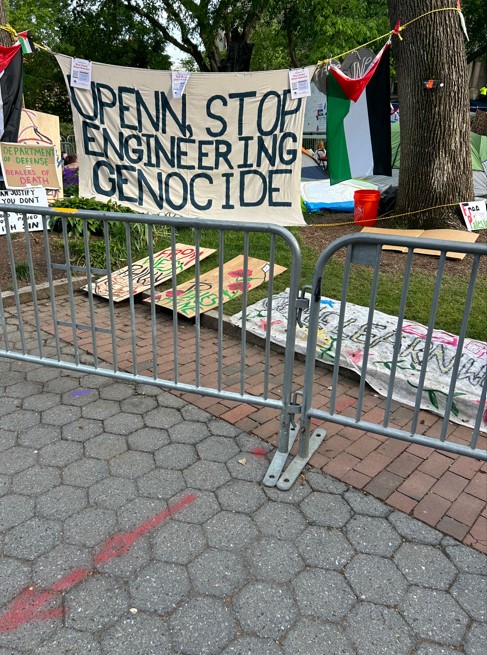In the early morning on Friday, police in riot gear showed up on the University of Pennsylvania campus, gave pro-Palestinian protesters two minutes to leave their tent encampment, then began making arrests.
University officials had asked protesters to leave for days as pressure from students, alums, professors, and others in the Penn community grew. Last week, more than 3,000 people signed a petition asking Penn officials to remove the protesters.
On Thursday, Gov. Josh Shapiro, who had served as state attorney general before running for governor, spoke out strongly against the protest.
He called the encampment “unstable” and “untenable.”
“It is past time for the university to act to address this, to disband the encampment,” said Shapiro. “And to restore order and safety on campus. Universities need to work with their own police departments or within the framework of their local police departments in order to make sure students are safe on campus.”
Shapiro’s remarks apparently gave Penn officials the impetus they needed after more than two weeks to move in and break up the encampment.
The protestors demanded information on the university’s investments and that it divest from any companies doing business with Israel.
For about two weeks, Bala Cynwyd resident Beth Samberg and friends have been going to the encampment at 4 a.m. with air horns to wake up the protesters. There is an encampment at her son’s university, but it is too far away for her to try to intervene, so she’s been going to Penn.
Samberg, who is “proudly Jewish,” said her son, 19, feels threatened by the pro-Palestinian protesters. “We brought him home a week early because of the encampment,” she said. “The [university] administration would not guarantee the safety of the Jewish kids.”
“I am not there to engage or escalate,” said Samberg about her early morning visits to the former Penn encampment. “I am only there to irritate.”
Now that the encampment is cleared, Samberg fears the protesters will return to Penn since she doesn’t have any confidence that progressive Philadelphia District Attorney Larry Krasner will charge them. But if they do, she will continue to wake them up at 4 a.m.
“And at the encampment itself, there were more non-Penn affiliated individuals than Penn students, she added.
A spokesperson for Krasner said his office is not involved.
“They were given Civil Violation Notices (CVNs) by Philly police and released,” said Krasner spokesman Dustin Slaughter.
Penn’s interim president, J. Larry Jameson, issued this statement, which says in part, “This decision is viewpoint neutral and affirmed by our policies. There are times when our abiding commitment to open expression requires balancing free speech with our responsibility to safety, security, and continuing the operations of the University. This is one of those times and why we have acted. Open expression and peaceful protest are welcome on our campus, but vandalism, trespassing, disruption, and threatening language and actions are not.”
The Jewish Federation of Philadelphia issued a statement saying it “commends the University of Pennsylvania for taking decisive action to disband the pro-Palestinian encampment on University of Pennsylvania’s campus this morning. While free speech and critical thinking are essential tenets both on and off college campuses, it had become increasingly clear over the past two weeks that the encampment fostered an atmosphere of intimidation and harassment, particularly towards Jews on campus.
“At a time when antisemitism is at an all-time high, institutions of higher education have a responsibility to ensure that the safety and well-being of Jewish students and faculty is protected. We thank Governor Shapiro, Mayor Parker, the Philadelphia Police Department, and the University of Pennsylvania Police Department for their help in resolving this issue so campus safety and inclusion can be prioritized.”
Sen. John Fetterman (D-Pa.) told Fox News anti-Israel activists should protest Hamas instead.
“It’s actually working against peace in Gaza, and Hamas is convinced that they’ve won the PR war and they keep seeing all these kinds of protests across the nation on these campuses. And it’s not helpful, but it’s actually — it works against peace, I think,” Fetterman said.
Sen. Bob Casey Jr. (D-Pa.) did not immediately respond when asked to comment.
Casey’s Republican opponent Dave McCormick, who told DVJournal that he opposed the university encampments, posted to social media Friday, “Good. The encampment should have been disbanded weeks ago.”
The Philadelphia Antidefamation League posted to X, “Now is the time for policy breakers to be held accountable. As we’ve said, we support and defend free speech; but free speech is not a free license to violate time, place and manner restrictions, harass peers, interfere with the education rights of other students on campus.”
Manuel Bonder, a spokesman for Shapiro, told DVJournal, “As Gov. Shapiro has made clear multiple times, all Pennsylvanians have a right to peacefully protest and make their voices heard. The governor has also made clear that universities have a legal responsibility to keep their students safe and free from discrimination.
“Unfortunately, the situation at Penn reached an untenable point – and as the university stated publicly, the encampment was in violation of university policy, campus was being disrupted, and threatening, discriminatory speech and behavior were increasing. After Penn’s weeks-long efforts to engage protestors were met with further escalation, today, the University of Pennsylvania’s leadership made the right decision to dismantle the encampment.
“We thank the City of Philadelphia, the Philadelphia Police Department, and University of Pennsylvania Police Department for their professional work to resolve the situation quickly and peacefully,” Bonder added.
Please follow DVJournal on social media: Twitter@DVJournal or Facebook.com/DelawareValleyJournal

